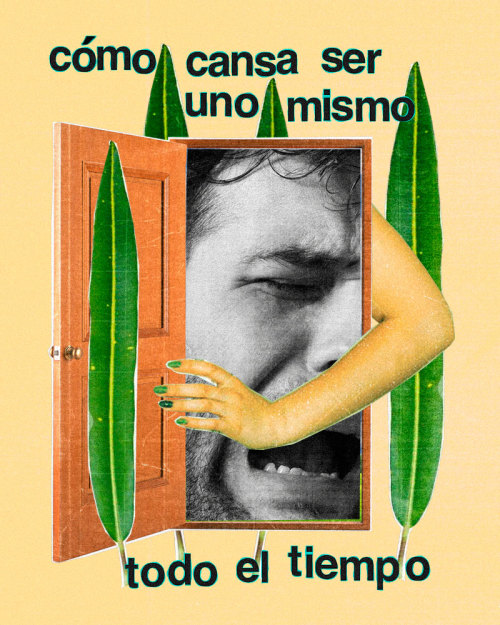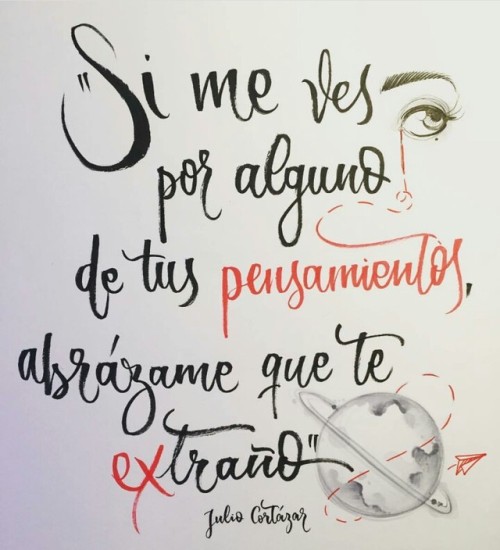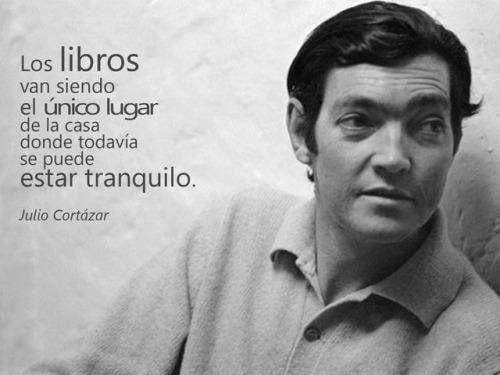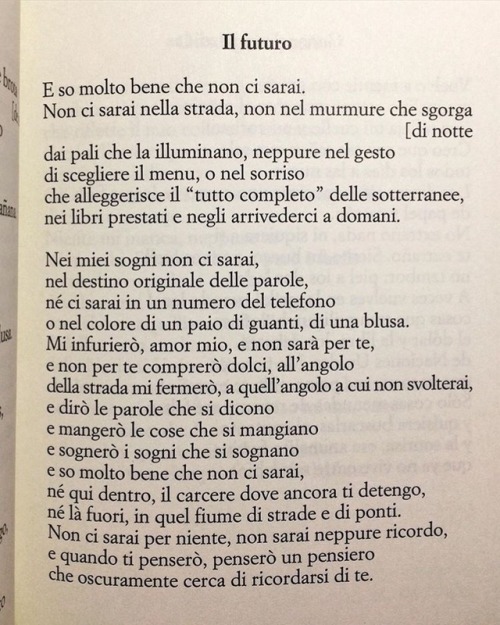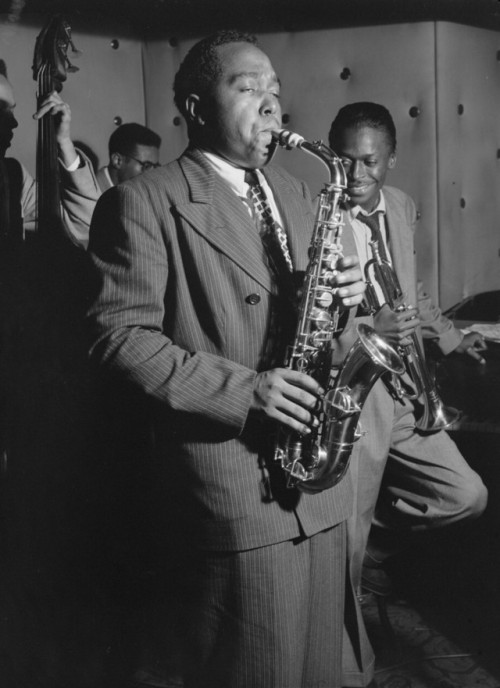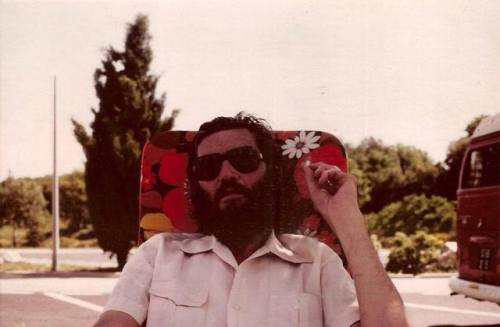#julio cortázar
“Yo quiero proponerle a usted un abrazo, uno fuerte, duradero, hasta que todo nos duela. Al final será mejor que me duela el cuerpo por quererle, y no que me duela el alma por extrañarle”.
— Julio Cortázar
Tengo tu foto; no para acordarme de ti cuando la miro, sino para mirarla cuando me acuerdo de ti.
-Julio Cortázar
«Oh mi amor, te extraño, me dueles en la piel, en la garganta, cada vez que respiro es como si el vacío me entrara en el pecho donde ya no estás»
–Julio Cortázar
“Only in dreams, in poetry, in play do we sometimes arrive at what we were before we were this thing that, who knows, we are.”
Julio Cortazar.
Post link
Vos no elegís la lluvia que te va a calar hasta los huesos…
- Julio Cortázar
Yo siempre he sido muy sentimental y lo sigo siendo, tengo muy mal gusto ¿Sabes? En materia de sentimientos soy fácilmente sentimental, soy de los que lloran en el cine y salen disimulando la cara.
- Julio Cortázar

Pase francés de tren y subte de Julio
I’ve fallen into the world of wristwatch enthusiasm and I’m pasting below (with a few edits) something that I wrote two weeks ago in a watch forum of sorts, some writing that I want to preserve here and that touches on frequent topics of this Tumblr like how we learn, wealth inequality, internet culture, etc. There will likely be additional watch content here in the near future.
William Gibson’s “My Obsession” from 1999 is something of a classic essay on eBay and collecting, and it’s specifically about his dive into watches. When I became interested in watches about a year ago, the product of research for a gift, I recalled reading Gibson’s piece (in print, no less!) when it was published and I looked it up. It’s a nice time machine to an earlier experience on the internet in addition to being a great story about watch enthusiasm. I’ll post two passages to bait you into reading the whole thing before moving on to some additional thoughts and a 2015 interview with Gibson about the essay.
Bait one:
But I didn’t really want to have to buy this very large watch. Which was in Uruguay. And now I was still high bidder, and the auction would be run off before I got back to Vancouver. I thought about having to resell the Zenith.
When I did get back, though, I discovered, to mixed emotions, that I’d been “sniped.” Someone, or rather their automated bidding software, had swooped in, in the last few seconds, and scooped the Zenith for only the least allowable increment over my bid.
Bait two:
Any Swatch or Casio keeps better time, and high-end contemporary Swiss watches are priced like small cars. But mechanical watches partake of what my friend John Clute calls the Tamagotchi Gesture. They’re pointless in a peculiarly needful way; they’re comforting precisely because they require tending.
And vintage mechanical watches are among the very finest fossils of the pre-digital age. Each one is a miniature world unto itself, a tiny functioning mechanism, a congeries of minute and mysterious moving parts. Moving parts! And consequently these watches are, in a sense, alive. They have heartbeats. They seem to respond, Tamagotchi-like, to “love,” in the form, usually, of the expensive ministrations of specialist technicians. Like ancient steam-tractors or Vincent motorcycles, they can be painstakingly restored from virtually any stage of ruin.
And, as with the rest of the contents of the world’s attic, most of the really good ones are already in someone’s collection.
But the best of what’s still available, below the spookily expensive level of a Sotheby’s watch auction, can still be had for a few thousand dollars at most. At the time of this writing, the most desirable vintage Rolex on one New York dealer’s Web site, a stainless steel “bubble back” automatic, is priced at $3,800, a fraction of the cost of many contemporary watches by the same maker. (And it’s so much cooler, possesses so much more virtu, than one of those gold-and-diamond Pimpomatic numbers!)
Yes, “they require tending.” See Cortázar(ororiginal Spanish). Also Pimpomatic! I guess we know what Gibson thinks about iced-out watches.
I hope you enjoy that essay as much as I do, and if you just read the essay and stop here, I will be happy to have shared that joy. But I am also posting about Gibson’s essay because I think it provides some insight into what is going on with Rolex (and to a great extent much of the watch world) right now and it helps expand on what I wrote in response (elsewhere) to a Jenni Elle video addressing accusations about Rolex collectors being “inauthentic”:
I enjoyed that video and agree with a lot within. I particularly like the insights about “cheating” and I’d love to see that point explored more because I think a lot of the resentment and subsequently the overuse (I’d say misuse, as Jenni implies) of the term authenticity is a reflection of the vast inequality in the world and the rapid acceleration of inequality through the pandemic. That goes for not only capital wealth, but also attention and status. Jenni used the word deserve (in air quotes) and I think that’s the big clue – people are sensing, as they do in many different ways, that society is rigged. It is. No one deserves to have vastly more than other people and no one deserves to have nothing. And all of this inequality has become more apparent in the watch world as new and wealthy watch collectors have arrived during the pandemic.
I love how in so many was the watch world reflects the wider world. I’ve only been an enthusiast for about a year now, and as I explain to people who are not, my watch explorations, readings, studies, what-have-you overlap with pretty much anything and everything. The watch world is like a caricature of the greater world in many ways.
Back to Gibson, here’s the part that relates to the Jenni Elle video and my repsonse:
an ongoing democratization of connoisseurship, in which curatorial privilege is available at every level of society
and
But the main driving force in the tidying of the world’s attic, the drying up of random, “innocent” sources of rarities, is information technology. We are mapping literally everything, from the human genome to Jaeger two-register chronographs, and our search engines grind increasingly fine.
More people have access to information that was once required a lot of effort to come by. Before this “map,” people who worked at acquiring that information, but had limited funds could still participate. It leveled the playing field to some extent. But now with the information so easily available, people with lots of funds have a nearly complete advantage. And that makes people resentful leading to those accusations of “lack of authenticity” that Jenni Elle talks about in her video.
And maybe I am less bothered than other watch fans in part because my interest in watches is more about learning than about accumulation. Again, Gibson brings some great insight here because his dive into watches was similar (although he did actually purchase some expensive watches, unlike me). In 2015, for WatchPaper, Michael Vinovich followed up with Gibson about his essay (another great read!), and Gibson said this:
People who’ve read this piece often assume that I subsequently became a collector of watches. I didn’t, at least not in my own view. Collections of things, and their collectors, have generally tended to give me the willies. I sometimes, usually only temporarily, accumulate things in some one category, but the real pursuit is in the learning curve. The dive into esoterica. The quest for expertise. This one lasted, in its purest form, for five or six years. None of the eBay purchases documented [in the essay] proved to be “keepers.” Not even close.
and
I actively enjoy having fewer, preferably better things. So I never deliberately accumulated watches, except as the temporary by-product of a learning curve, as I searched for my own understanding of watches, and for the ones I’d turn out to particularly like. I wanted an education, rather than a collection. But there’s always a residuum: the keepers. (And editing is as satisfying as acquiring, for me.”
“The real pursuit is in the learning curve.” Yup, that’s me. All of this is also further evidence of why William Gibson is paid to write – the man has a way with words.
To close this already long post, here is one more great passage from that interview that also resonates with me, particularly the point about “power-jewelry exclusivity”:
With a very few exceptions, contemporary luxury Swiss doesn’t appeal to me. I feel those watches have become power-jewelry exclusively, a class of archaic luxury item. Your phone tells more accurate time. I respond most to watches from the century in which they were utterly necessary. If someone offered me any free contemporary watch of my choosing, provided I’d promise never to resell it, I’d probably choose a Grand Seiko. I find their product, this century, more appealing than that of the Swiss.”
That’s a pretty great perspective and a good argument for collections to be more about vintage with one contemporary piece for wearing that reflects something truly new.
PS: If you are wondering what watches Gibson did keep, at least until 2015, check out the rest of the interview.
L í n e a 3 .
Colección de dibujitos.
Título: Axolotl.
Hubo un tiempo en que yo pensaba mucho en los axolotl. Iba a verlos al acuario del Jardín des Plantes y me quedaba horas mirándolos, observando su inmovilidad, sus oscuros movimientos. Ahora soy un axolotl.
Julio Cortázar.
Post link
“A veces no necesitamos a alguien que nos arregle, a veces, solo necesitamos a alguien que nos quiera, mientras nos arreglamos nosotros mismos”.
-Julio Cortázar.
“Andábamos sin buscarnos pero sabiendo que andábamos para encontrarnos”.
-Rayuela, Julio Cortázar.
“El peor sentimiento es no saber si esperar un poco más o rendirse”.
-Julio Cortázar.
e so molto bene che non ci sarai.
non ci sarai per niente, non sarai neppure ricordo, e quando ti penserò, penserò un pensiero che oscuramente cerca di ricordarsi di te.
…dirò le parole che si dicono e mangerò le cose che si mangiano…
Post link
Johnny è convalescente in un letto grandissimo e molto bello, prende latte a secchi, legge il “Paris Match” e il “New Yorker”, tirando fuori, a momenti, il suo famoso (e rognoso) libretto tascabile di poesie di Dylan Thomas, con note a matita da tutte le parti. Con queste notizie e un cognac preso al caffè dell'angolo, ci siamo sistemati nella sala di audizioni per ascoltare Amorous e Streptomicyne. Art ha chiesto di spegnere le luci e si è coricato per terra per ascoltare meglio. E allora è entrato Johnny e ci ha passato la musica sul viso, è entrato anche se si trovava nel suo albergo, disteso nel letto, e con la sua musica ci ha spazzati via per un quarto d'ora. Io capisco che lo faccia andare su tutte le furie che venga pubblicato Amorous, perché chiunque si accorge delle imperfezioni, del soffio perfettamente percettibile che accompagna la fine di alcune frasi, e soprattutto della selvaggia caduta finale, quella nota sorda e breve che mi è parsa un cuore che si spezza, un coltello piantato nel pane (ed egli parlava proprio del pane, giorni addietro). Ma invece a Johnny dovette sfuggire ciò che per noi è terribilmente bello, l'ansia che cerca sfogo in quell'improvvisazione piena di fughe in tutte le direzioni, di interrogazione, di tentativi disperati. Johnny non può capire (perché quello che per lui è un fallimento sembra a noi una strada, o almeno il segnale di una strada). L'artista che è in lui diventerà frenetico di rabbia tutte le volte che ascolterà quella contraffazione del suo desiderio, di tutto quello che volle esprimere mentre lottava, vacillando, sputando saliva dalla bocca insieme alla musica, più che mai solo al cospetto di quello che persegue, di quello che gli sfugge quanto più lo persegue. E’ curioso. (…) Nessuno può sapere che cos'è che Johnny persegue, ma è così, si trova lì in Amorous, nella marijuana, nei suoi insensati discorsi su tante cose, nelle ricadute, nel libretto di Dylan Thomas, in tutto quel povero diavolo che è Johnny, che lo ingrandisce e lo converte in un assurdo vivente, in un cacciatore senza braccia e senza gambe, in una lepre che corre dietro ad una tigre che dorme. E mi vedo costretto a precisare che in fondo Amorous mi ha fatto venire voglia di vomitare, come se ciò potesse liberarmi da lui, da tutto quello che in esso corre contro di me e contro tutti, quell'informe massa nera senza mani e senza piedi, quello scimpanzè ammattito che mi strofina le dita sulla faccia e mi sorride con tenerezza
Julio Cortàzar,Il persecutore
Post link
Qui tutto gli fa male, persino l'aspirina gli fa male. Davvero, ieri sera gli ho fatto prendere un'aspirina perché aveva mal di denti. L'ha afferrata e ha cominciato a guardarla, cosa gli è costato per decidersi ad inghiottirla. Mi ha detto cose stranissime, che era pericolosissimo servirsi di cose che in realtà non si sa che sono, cose che sono state inventate da altri per calmare altre cose che neppure si sa che sono…
Lei sa com'è quando comincia ad almanaccare.
(…) - Una vittima della cosità, è evidente.
- Che cos'è la cosità? - disse la Maga.
- La cosità è lo spiacevole sentimento che laddove termina la nostra presunzione comincia il nostro castigo. Mi spiace di dover usare un linguaggio astratto e quasi allegorico, ma voglio dire che Oliveira è patologicamente sensibile all'imposizione di ciò che lo attornia, del mondo in cui vive, di ciò che gli è toccato in sorte, per dirla gentilmente. In una parola, gli fa schifo la circostanza. Per farla breve, il mondo gli fa male.
Julio Cortazar,Rayuela, il gioco del mondo
Post link
All profound distraction opens certain doors. You have to allow yourself to be distracted when you are unable to concentrate.
— Julio Cortazar
Post link




